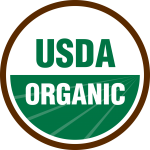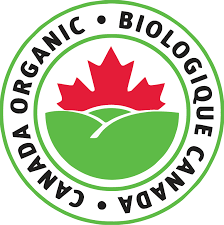
Organic labelling claims are regulated in the USA under their Organic Foods Production Act of 1990. The United States Department of Agriculture (USDA) National Organic Program (NOP) is administered by their Agricultural Marketing Service (AMS). The USDA NOP Organic standard is included in the Code of Federal Regulations Regulatory Text 7 Part 205, Subpart A, which is updated regularly, so best viewed directly through the e-CFR website.
The National List of Allowed and Prohibited Substances can be found in Subpart G of the National Organic Program. This subpart also details the requirements for certifying agents (certification bodies (CBs)) accredited to offer NOP certification. Accreditation for CBs is only available directly from the USDA’s NOP.
The USDA National Organic Program Handbook includes policy memos and guidance documents that may assist with practical interpretations of the rules and regulations
The USDA Organic Seal is a mandatory logo for organic produce certified to the NOP. A certifying agent’s logo may also be used, but may not be more prominent than the USDA logo.
In Australia, USDA NOP certification is provided by some CBs as an add-on to our baseline National Standard (NS) or Australian Certified Organic Standard (ACOS) certification. However, it is important to note that each product to be marketed in the USA as organic must be certified not only to our National Standard (to make it legal to export), but also to the USDA NOP Standard – to make it legal to be imported into the USA.

Europe has a strong history of leadership in regulation of organic produce claims and has had regulation in place since 1991. Council Regulation (EC) No 834/2007 defines the aims, objectives and principles of organic farming and production, and No 889/2008 and No 1235/2008 detail the organic production, labelling, control and import rules. Amendments to these regulations are published from time to time, and can be found on the European Commission legislation website.
The EU organic logo can only be used on products that have been certified as organic by an authorised control agency or body.
In May 2018, the EU published a new Regulation (EU) 2018/848 on organic production and labeling or organic products and repealing Council Regulation (EC) No 847/2007. The new legislation comes in to force in January 2021.
Australia enjoys access to the EU market by virtue of an Equivalence Agreement that is held with the Department of Agriculture, Water and Environment (DAWE) for plant products, and for livestock products via equivalence arrangements held with private Certification Bodies. These equivalency agreements will allow continued market access, however are required to be renewed according to the new regulation before 2025.

Canada has in place national legislation (Organic Products Regulations) and a certification scheme that is controlled by the Canadian Food Inspection Agency (CFIA). The Canada Organic Regime (COR) is delivered by government accredited CBs, according to the Organic Production Systems: General Principles and Management Standards (CAN/CGSB-32.310). Permitted substances are listed in the Organic Production Systems: Permitted substances lists standard (CAN/CGSB-32.311).
Practical interpretations of the COR standards are provided by the Standards Interpretations Committee (SIC), and are published as Q&As on the Canada government website.
Fortunately, the equivalence arrangements that have been struck between the USA and Canada includes third countries. What this means is that Australian organic produce can be sent to Canada, as long as it is certified to the USDA NOP, and carries an additional Attestation of Compliance to the Canadian Organic Products Regulations. Organic produce sent to Canada under this arrangement must however comply to the Canadian labeling rules – including use of their Canada Organic Logo. For further details, contact your USDA accredited certification body.

As the UK has now left the EU, the equivalence arrangement that is in place with the EU no longer includes UK market access. Trade negotiations are underway with the UK, which are likely to include organic produce. In the mean time, the UK has confirmed that market access will continue to be granted under the prior EU equivalence arrangement, at least until December 31st, 2020.
Australian Organic Ltd is contributing to these negotiations in the hope that our government will quickly develop with a plan for continued market access in 2021 and beyond. For further information on the unfolding situation with the UK, please refer to the Gov UK website.
![]()
The Agriculture and Food Agency (AFA), part of The Taiwan Council of Agriculture (COA) administer the regulation of organic product claims in Taiwan. The Organic Agriculture Promotion Act 2018 is Taiwan’s current legislation enabling enforcement of their organic standards.
There exists an Organic Taiwan Traceability Agricultural Product (OTAP) national organic logo, however it is only allowed for use on Taiwanese produce.
Australia recently achieved an equivalence arrangement with Taiwan, which allows Australian operators to export organic produce to Taiwan without any additional certifications. However, there are some exclusions and also some additional requirements for each consignment that exporters should be aware of.
For a full list of exclusions and additional consignment by consignment requirements, please refer directly to the Department of Agriculture, Water and the Environment (DAWE) announcement.
The use of the word ‘organic’ on produce in China is regulated by the National Standards for the People’s Republic of China: Organic Products (GB/T19630-2011).
There are various government departments involved in the implementation of the above regulation. There exists a national logo, which is mandatory. Unfortunately, we do not have a government equivalence arrangement, and no Australian certification bodies are able to directly offer certification for this market, however some have put in place commercial agreements with Chinese certification bodies, allowing a cooperative approach to provision of China market access for Australian exporters.
ACO Certification Ltd, and NASAA Certified Organic may be able to assist with Chinese market access via commercial agreements with Chinese certification bodies.